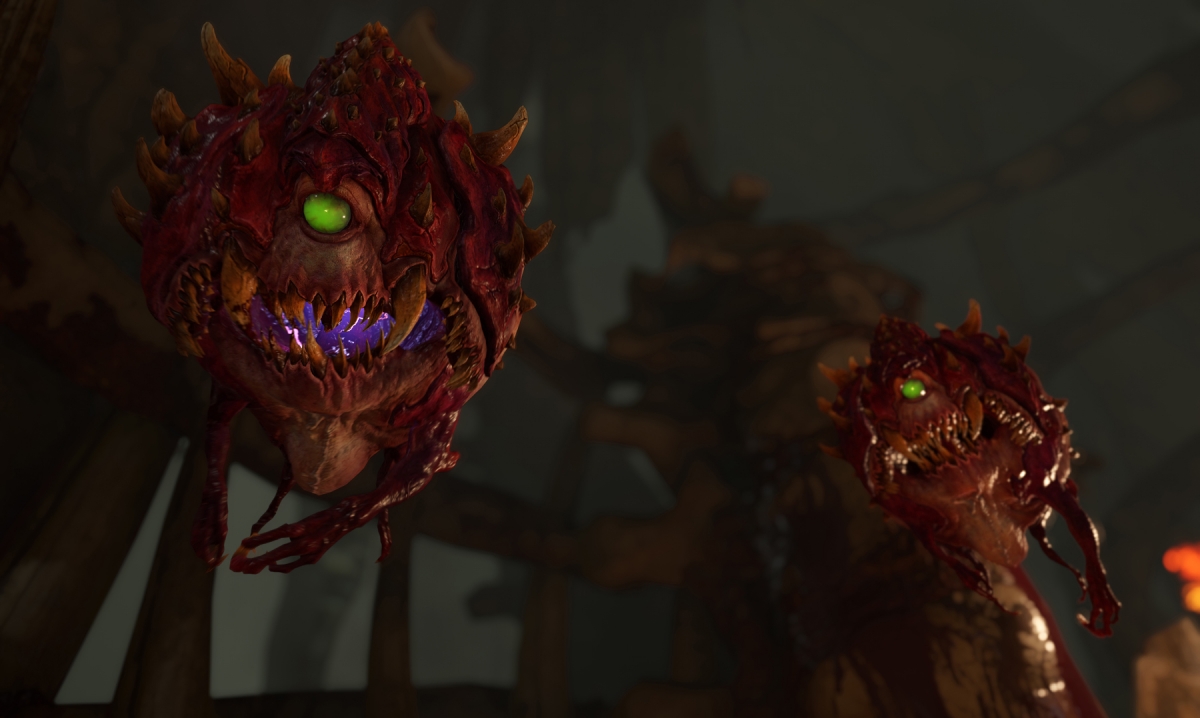Doom review: id Software's 2016 reboot is the best shooter in over a decade
Blood rains in id Software's glorious modern reboot.
Doom
Platforms: PS4 (tested), Xbox One, PC
Developer: id Software
Publisher: Bethesda Softworks
Release Date: Out Now
Reinventing Doom in 2016 demands that you both preserve the original's essence, its memory, and its benchmark-levels of technical and creative achievement and also, somehow, produce something fresh. Stray too far from the original and its fanbase (basically everyone who's ever played a video game) will revile you. Copy it too closely and you'll seem unimaginative and out of touch – compared to the hugely influential 1993 progenitor, your game will quickly be forgotten as just another cash-in.
Never in my history of reviewing big, franchise video games have I seen such nuanced a understanding of lineage, and fan and critic expectations, as in id Software's Doom reboot. I enjoyed playing this new Doom more than I enjoy – or ever did enjoy – playing the original. It's fast. It's bloody. It's consistently and seriously written: it's the best new AAA shooter I've played in years. I doubt very much it will have the lasting influence of its forebear, and to that extent I might not call it concretely "better", but certainly Doom is a brilliant piece of work. After a decade of occasionally interesting but largely staid big budget first-person shooters (FPS), here is one that is truly invigorating.
'Spectacle' has become the byword of FPS design. As of today, it connotes a gimmicky, one-off scene of destruction that's easily pitched. Blow up the Eiffel Tower. Massacre civilians in an airport. Set off a nuke. By this contemporary measure, Doom is abjectly disinterested in spectacle. There are no turgid cutscenes, no weak attempts to shock, no stand-still-and-watch moments of environmental destruction – and it's partly why the game is a more exciting, spectacular game than all its peers put together. The central act of aiming, killing and trying not to get killed yourself – the nuances of which have been neglected by other shooters – is refined.
Movement is fast and fluid, and enemies are numerous, but the battles never feel messy or chaotic. Bullets and health are plentiful, but you never feel truly safe. Perhaps Doom's greatest achievement (and most fitting tribute to its ancestor) is its complex, but never convoluted level design. Environments are sprawling, tiered, visually stimulating and littered with secrets, but always negotiable and straightforward. The game's largest battles take place in enclosed arenas, reminiscent of, say, the double staircase room of the original Doom's Phobos Lab. In these fights you've enough room to run, dodge and manoeuvre but not to get lost. Likewise, as you openly explore the corridors of the Mars base, or the chasms of Hell itself, there are optional routes and hidden trinkets, but never enough to overwhelm Doom's all-important sense of momentum.



There is no cover system, no recharging health and no reloading. Whether pirouetting around enemies, scanning for items or racing through to the next gunfight, one way or another you are constantly in motion. This electric pace is counterweighted by difficult enemies and health and ammo that always needs to be topped up. In short, Doom is consistently, perfectly balanced. There isn't a single section that drags too long, nor one that is either too easy or too hard. The amount of attention given to every single moment, and the understanding id Software has of game-making craft, is perpetually self-evident.
Yet for all its rigorously designed systems, Doom plays incredibly simply. "Get back to Mars," reads one objective. "Kill Olivia Pierce," says another. Like Doomguy himself, you always have a clear idea of what you need to do combined with the tools and abilities to pursue your goals doggedly. The game has a story and it's brisk, efficient and clean: enough to keep you interested but never a pull on the action.
Also noteworthy is Doom's resistance to easy nostalgia and franchise in-jokes. It's frenetic and gory, but never knowing. Doom never makes a point of its own "craziness" or "wackiness." It's a straight-faced, earnest attempt to be something different and better than its contemporaries, and never tries to disguise a lack of confidence behind irksome video game humour.
Intelligent, fresh and endlessly enjoyable, Doom is more than a tribute to its beloved progenitor. Taken in its own right, this is the most finely crafted, technically impressive pure shooter in over a decade, proving that id Software, even after 26 years, is an adept, sophisticated game-maker. It may not create the same tectonic shift in video game culture as its ancestor, but personally, I prefer this Doom to the original. By refining, meticulously, several age-old and taken-for-granted game mechanics, Doom proves that excitement, spectacle and even narrative cohesion can exist in games seemingly composed of the basest elements.
For all the latest video game news follow us on Twitter @IBTGamesUK.
© Copyright IBTimes 2025. All rights reserved.




















